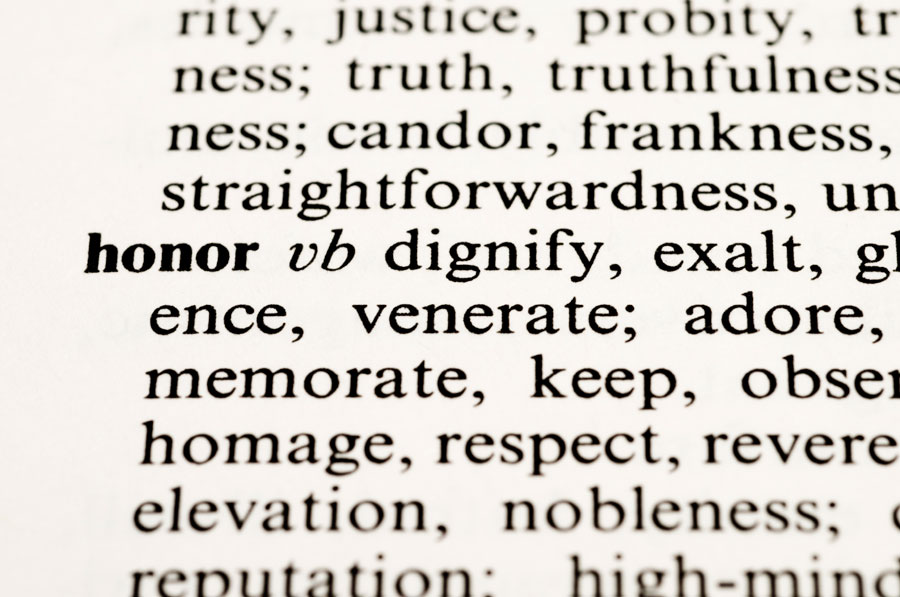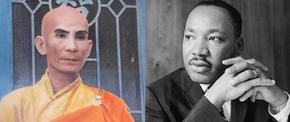The views expressed in our content reflect individual perspectives and do not represent the authoritative views of the Baha'i Faith.
But the honor of the human kingdom is the attainment of spiritual happiness in the human world, the acquisition of the knowledge and love of God. The honor allotted to man is the acquisition of the supreme virtues of the human world. This is his real happiness and felicity. – Abdu’l-Baha, The Promulgation of Universal Peace, p. 166.
We commonly think of honor as a form of public recognition and distinction—but it’s the private, unspoken recognition and distinction that really counts. Personal honor matters much more than public honor.
This series of essays started off by exploring the Baha’i month of “Questions” because a friend asked: “What does the Baha’i month of ‘Questions’ mean?” I realized then that the very same question could be asked of each Baha’i month, as to what the name or attribute of that particular Baha’i month signifies, both as a godly quality and a goodly action.
 “Honor” (Sharaf, in Persian) is the name of the 16th Baha’i month in the 19-month, 19-day Baha’i Calendar. The month of “Honor” lasts from the end of December to the middle of January.
“Honor” (Sharaf, in Persian) is the name of the 16th Baha’i month in the 19-month, 19-day Baha’i Calendar. The month of “Honor” lasts from the end of December to the middle of January.
I’m honored to write about “honor,” but I must admit, it’s somewhat daunting to write about these attributes of God as they may be expressed in human actions. A small voice whispers inside of me: “Who do you think you are—preaching about perfections to others? Just take one look in the mirror and you’ll see what I mean!”
So, even though each article published on BahaiTeachings.org has a disclaimer, let me emphasize the fact that I do not feel worthy of talking about perfections like honor, except insofar as these are virtues that merit our attention, and should spark our desire and willingness to translate these virtues and qualities into practical and productive action, which can benefit others and thereby ourselves in the process.
That said, here are some personal reflections on the topic of “honor,” for what they are worth. These comments are meant to start conversations, to get people thinking (myself included) and generally to stimulate thought and reflection on some of the higher aspirations of life.
This is the definition of honor from the Oxford English Dictionary that I’d like to focus on:
- a. Quality of character entitling a person to great respect; nobility of mind or spirit; honourableness, uprightness; a fine sense of, and strict adherence to, what is considered to be morally right or just. – Oxford English Dictionary, Third Edition.
Honor is probably most commonly thought of as a form of public recognition and distinction. But the private recognition and distinction of an individual is really what counts. That’s what really matters — personal honor.
Honor obviously is not empty flattery. It even goes beyond a show of deference and respect. Honor can be given. Honor can also be yearned for, learned and earned. One manifestation of “honor” is to act honorably. I know this sounds tautologous and redundant, by using one form of a word to describe the very same word, but I think you know what I mean.
Honor is not only something external, but a quality that is internalized as well. Being “honorable,” many would agree, means having a good character. Character development primarily occurs during childhood, something the Baha’i writings are careful to point out:
And yet, if we ponder the lessons of history it will become evident that this very sense of honor and dignity is itself one of the bounties deriving from the instructions of the Prophets of God. We also observe in infants the signs of aggression and lawlessness, and that if a child is deprived of a teacher’s instructions his undesirable qualities increase from one moment to the next. It is therefore clear that the emergence of this natural sense of human dignity and honor is the result of education. – Abdu’l-Baha, The Secret of Divine Civilization, p. 11.
Here, Abdu’l-Baha says that “the emergence of this natural sense of human dignity and honor is the result of education”—which means we can best cultivate such intrinsic honor through educating children and youth.
Acting honorably means to act with integrity. It calls for self-respect, while respecting others. Honor also means to act in the best interests of humanity:
And the honor and distinction of the individual consist in this, that he among all the world’s multitudes should become a source of social good. Is any larger bounty conceivable than this, that an individual, looking within himself, should find that by the confirming grace of God he has become the cause of peace and well-being, of happiness and advantage to his fellow men? No, by the one true God, there is no greater bliss, no more complete delight. – Ibid., pp. 2-3.
Acting for the greater good attracts the greatest of all honors, morally and spiritually. Whether or not such efforts to promote the commonweal and “social good” are recognized is beside the point. If that happens, fine. If not, no matter.
The truest and finest honor is not to be honored, but to be the living embodiment of honor itself.
…man’s supreme honor and real happiness lie in self-respect, in high resolves and noble purposes, in integrity and moral quality, in immaculacy of mind. – Ibid., p. 19.
Perhaps Abdu’l-Baha gives us the single best summation of what individual honor consists of, from a Baha’i perspective:
Then it is clear that the honour and exaltation of man cannot reside solely in material delights and earthly benefits. This material felicity is wholly secondary, while the exaltation of man resides primarily in such virtues and attainments as are the adornments of the human reality. These consist in divine blessings, heavenly bounties, heartfelt emotions, the love and knowledge of God, the education of the people, the perceptions of the mind, and the discoveries of science. They consist in justice and equity, truthfulness and benevolence, inner courage and innate humanity, safeguarding the rights of others and preserving the sanctity of covenants and agreements. They consist in rectitude of conduct under all circumstances, love of truth under all conditions, self-abnegation for the good of all people, kindness and compassion for all nations, obedience to the teachings of God, service to the heavenly Kingdom, guidance for all mankind, and education for all races and nations. This is the felicity of the human world! This is the exaltation of man in the contingent realm! This is eternal life and heavenly honour! …
As the compassionate Lord has crowned the head of man with such a refulgent diadem, we must strive that its luminous gems may cast their light upon the whole world. – Abdu’l-Baha, Some Answered Questions, newly revised edition, pp. 89—90.
The American spelling of “honor” lacks the British “u.” Time to put the “you” back in “honour!”
You May Also Like
Comments

















As to those souls who are preaching the Word of God, it behooveth them to shake the dust of every land which they have passed by off their shoes and to be with God and without need of the rich—although their bed is the soil, their light is the stars of the sky and their food is the herbs of the desert—because ...theirs is the wealth of the Kingdom, the honor of the realm of might and the bounty of the divine world; and they are not in want of this world and its cares. Their throne is the mat of humility, their honor is in suffering every lowliness in the path of the Loving Lord and their wealth is being empty-handed from the pomps of the world and its vanities and their provision is trusting in God and being severed from all that is on the earth and its wealth. — Tablets of Abdul-Baha Abbas, pp. 60–61.